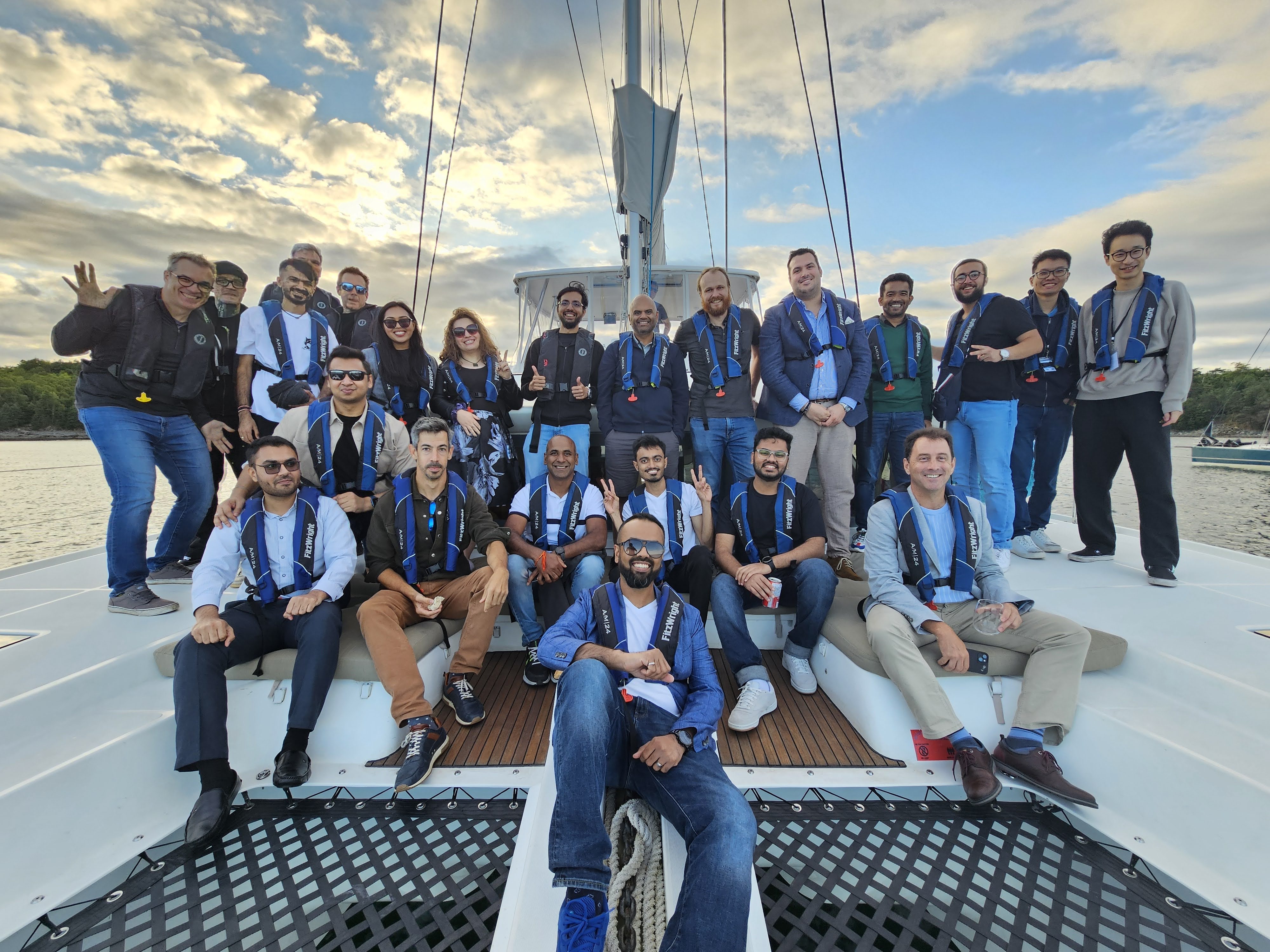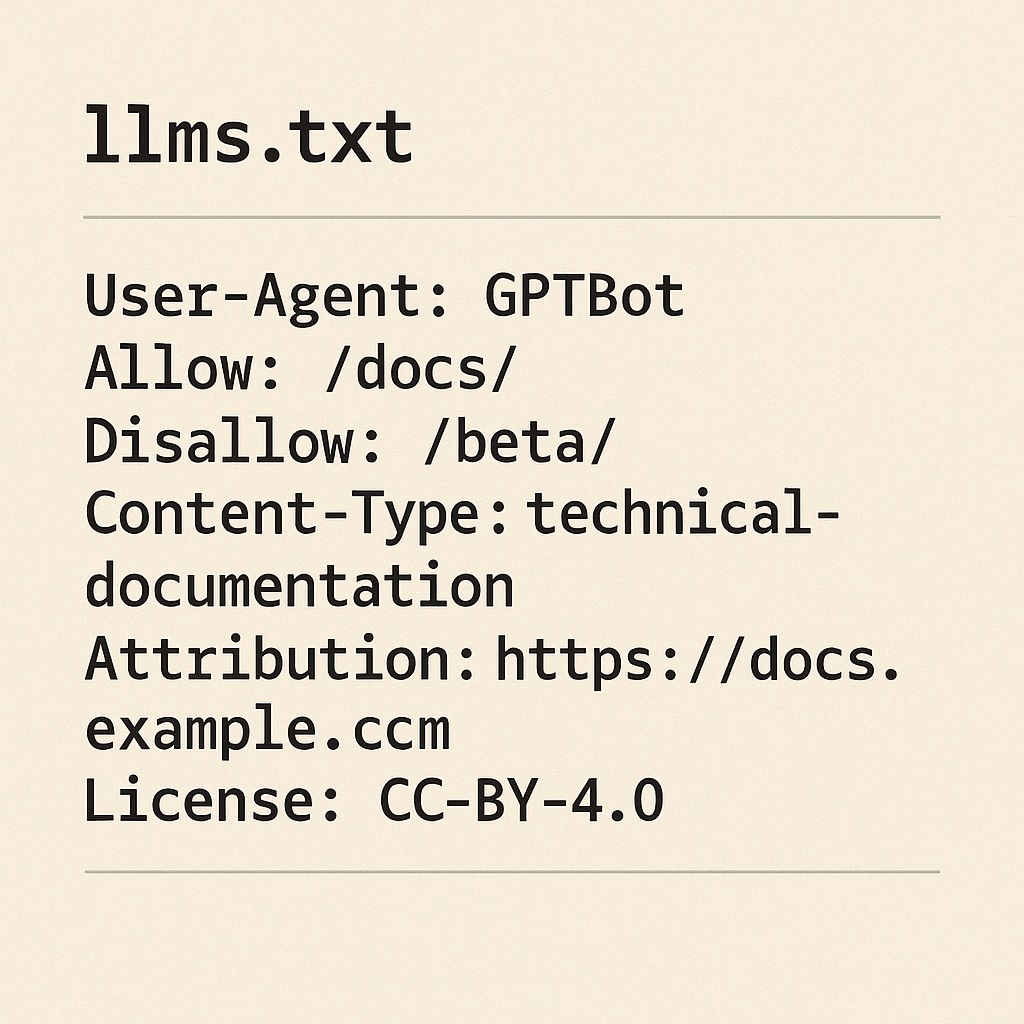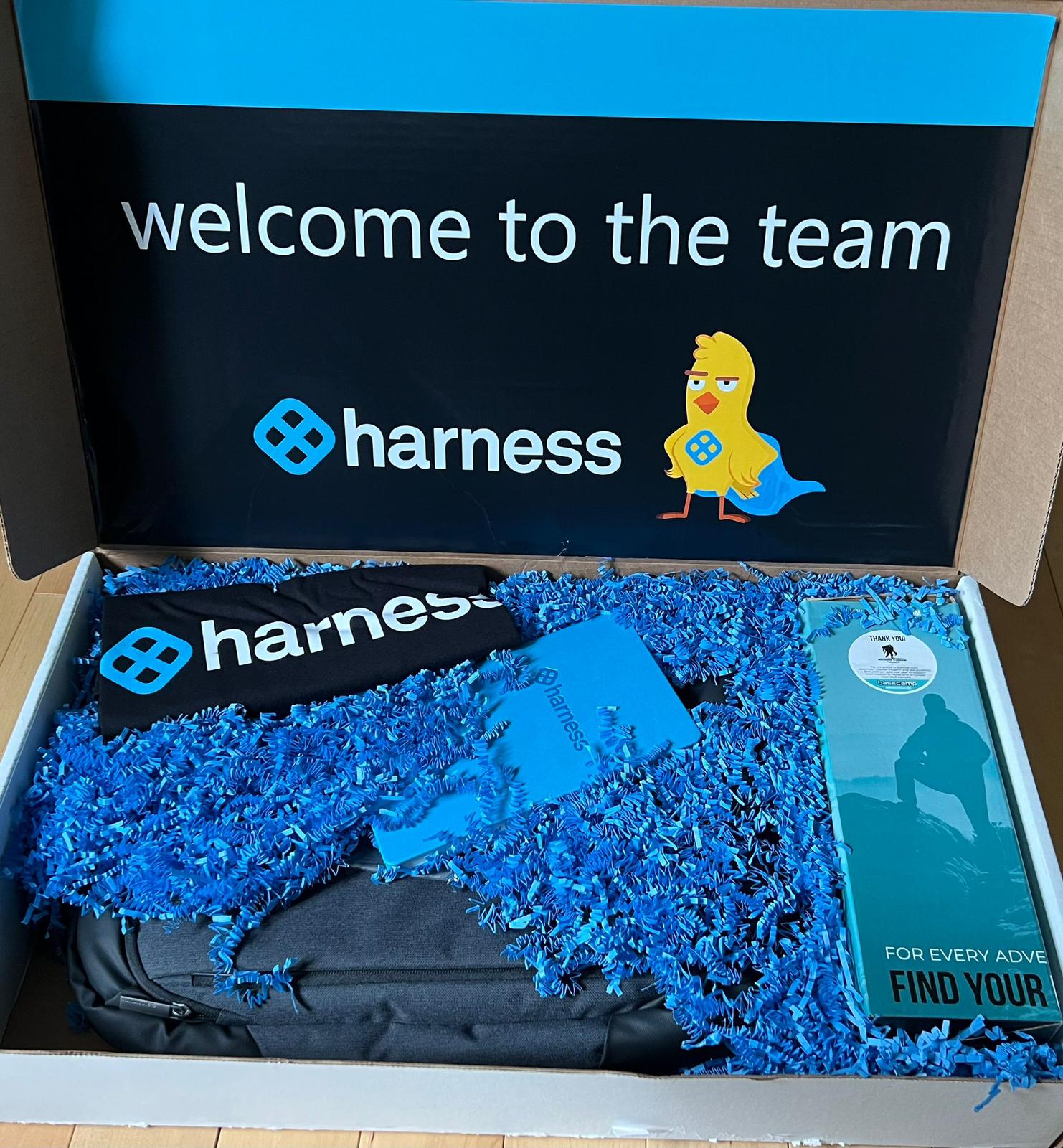Hosting a (DevOpsDays) Tech Conference
In August 2024, we pulled off the first-ever DevOpsDays Halifax, and wow, what an experience! As one of the organizers, I’ve got a ton of stories, lessons learned, and tips to share. Whether you’re looking to host your own DevOpsDays or just thinking about organizing any tech event, this blog’s for you. From planning to community building, there’s a lot here that can help you on your journey, no matter the type of event you’re aiming to create.
Story
During the pandemic, I relocated from Toronto, Ontario to Moncton, New Brunswick. The move was motivated by the region’s affordable housing, friendly people, and stunning landscapes—Atlantic Canada had everything, except a vibrant tech scene. This void inspired me to start a tech meetup.
Back in Toronto, I had been managing two meetup groups with thousands of members and was a regular speaker at meetups and conferences. When I moved to Atlantic Canada, I knew I wanted to bring that same energy and sense of community to the region. I teamed up with Nahrin Jalal, the ideal collaborator for this venture, and together, we launched the Atlantic Canada Tech Meetup on a crisp fall evening, September 29, 2022.
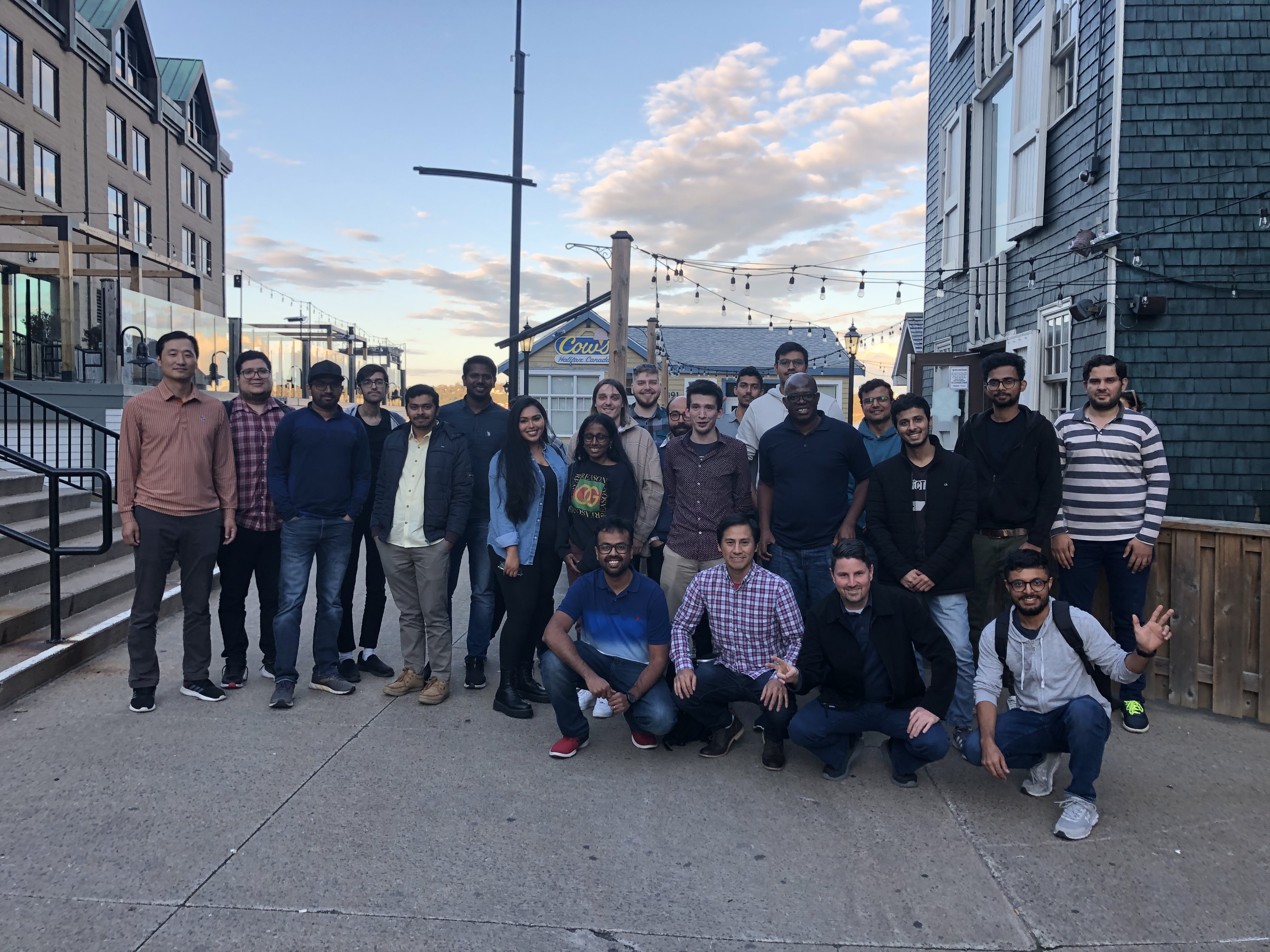
Our first event was small and grassroots—I even printed a simple Meetup this way –> sign on an A4 paper and taped it to the door so folks could find us. Despite the modest setup, around 25 people showed up that night, all expressing the same sentiment: they had been searching for a tech event in Halifax but couldn’t find one. This confirmed what we had suspected—there was a real need for a tech community in the region.
Buoyed by this interest, we began hosting bimonthly meetups starting in January 2023. The growth was exponential, and with each event, the community grew stronger. It wasn’t long before Nahrin and I realized that we needed to take this initiative to the next level. We decided it was time to bring a premium developer conference to Atlantic Canada, and that’s how the journey toward organizing DevOpsDays Halifax began.
Why DevOpsDays
When we started thinking about hosting a tech conference, we had two main options: either create something entirely new or bring in an established conference. It’s like the classic software dilemma: do you build your own tool or use something tried and tested? I’ve seen enough DIY disasters in the software world to know that going with an established brand is usually the safer bet.
Now, we wanted a general tech conference that would resonate with the local tech community here in Atlantic Canada. Having spoken at a bunch of DevOpsDays events before, I already knew how much I respected the values and the community around it. DevOpsDays isn’t just about DevOps—it’s about collaboration, continuous improvement, and fostering a space where tech folks can actually connect and learn from each other.
Choosing DevOpsDays was an obvious choice, and it quickly proved to be the right one. With their framework, branding, and organizer support, we were able to tailor the event for our community, bringing global credibility and strong connections to our local tech scene.
The organizing guide is the only resource you need to get started if you’re planning to host a DevOpsDays conference.
Forming the Team
Nahrin and I, co-organizers of the Atlantic Canada Tech Meetup, kicked off our search for some motivated folks to help us bring DevOpsDays to life. First up was Matt Joy, a Google Customer Engineer who was actually one of our first speakers at the meetup—so we reached out, and he was all in. Then came Seif Elbayomi, a final-year CS student at Dalhousie University. He originally applied as a volunteer, but his application stood out so much that we knew we had to bring him on as an organizer.

We couldn’t have asked for a better team. With a mix of event experience, industry connections, and student reach, our diverse skills and expertise made us a perfect fit to take on the challenge.
Operating with $0 Budget
When organizing DevOpsDays Halifax, we had a unique challenge. This wasn’t New York, San Francisco, or Berlin—there were no big tech companies with massive marketing budgets here in Atlantic Canada. In fact, when we started, we had exactly $0.00 in our bank account.
We knew sponsorship would be key to pulling this off, so we reached out to nearly 100 contacts and companies, hoping to find organizations willing to back the event. At first, we had grand visions of hosting it at a convention center or one of the local hotels. However, reality hit hard when we saw the costs. Here’s what we were looking at:
| Venue | Minimum Catering Cost | Total Cost |
|---|---|---|
| Convention Centre | 40000 | 52000 |
| Hotel A | 50000 | 55000 |
| Hotel B | 48000 | 55000 |
For a tech conference in Halifax with no funds to start, these prices were far beyond our reach—despite them being a fraction of what venues would charge in larger cities.
Realizing we had to get creative, we began exploring other, more affordable options. That’s when we reached out to Dalhousie University, and they turned out to be a wonderful partner. Not only was their venue rate much more reasonable, but there was also no minimum catering cost, a major win for us. Since venue and food make up the biggest expenses for most events, this gave us the breathing room we desperately needed to move forward.
But we still needed a downpayment to secure the venue. So, we reached out to some of the other DevOpsDays cities for support. DevOpsDays London generously stepped up and offered us the downpayment for the venue—this was in August 2023, a full year before our event. At that point, we didn’t even have a sponsorship prospectus ready, but we knew we needed to lock in the date and venue to take the next steps.
A heartfelt shoutout to Bob and the DevOpsDays London team—you embody the spirit of the DevOpsDays community. Without your early support, there’s a good chance this event wouldn’t have happened.
Now, here’s a bit of a humble brag: DevOpsDays Halifax took frugality to new heights when it came to pulling off a tech conference on a shoestring budget. I can’t help but wonder if any other DevOpsDays event managed to happen with less! If so, I’d love to hear that story.
Not-for-profit or Not?
One of the first big decisions we faced as organizers was whether to set up DevOpsDays Halifax as a not-for-profit. Going this route has clear advantages: it opens the door to a variety of public and private funding opportunities that aren’t available to for-profit ventures. As a community-driven event, our goal was never to make a profit—in fact, many of us ended up covering out-of-pocket expenses to make it happen. So, aligning with not-for-profit principles seemed like a natural fit.
However, becoming a not-for-profit comes with its own set of challenges. There’s the overhead of registering the organization, setting bylaws, filing annual documents with Corporations Canada, and ensuring compliance with specific regulations. As first-time organizers already juggling countless tasks, the additional hassle and administrative burden outweighed the potential benefits at that moment.
We also discovered that many companies with not-for-profit sponsorship programs have long lead times. Some require applications to be submitted six months or more in advance—far too early for us, given where we were in the planning process. This made it clear that while not-for-profit status might help with future events, it wasn’t going to provide immediate sponsorship opportunities for our first year of DevOpsDays Halifax.
In the end, we decided to move forward without formal not-for-profit status. Our focus was on getting the event off the ground, even if it meant leaning more on personal resources and sponsorship hustle than on the perks that could come with official registration.
Venue
We were fortunate to partner with Dalhousie University for the venue, which turned out to be an ideal fit for DevOpsDays Halifax. The Scotiabank Auditorium, located in the heart of downtown Halifax, could comfortably seat 215 attendees, making it the perfect size for our first conference. In addition to the auditorium, we also booked two extra rooms—one designated as a space for organizers and volunteers to manage behind-the-scenes logistics, and another as a speaker lounge where presenters could prepare for their sessions.
Dalhousie’s central location was a big win for attendees. It’s within walking distance of plenty of hotels and restaurants, making it easy for out-of-town guests to settle in and enjoy the event. Plus, being only a 30-minute drive from Halifax Stanfield International Airport, it was convenient for speakers and attendees flying in from outside the city.
One of the best parts about choosing Dalhousie was the built-in A/V capabilities that came with the auditorium. They provided essential tech, but we supplemented it with extra equipment—renting additional microphones for the emcee and ensuring we had everything needed to keep the event running smoothly. We also rented tables and chairs for the registration desk and sponsor booths, which helped create a professional setup for attendees to interact with our sponsors and check in without any fuss.
Dalhousie University not only gave us a beautiful, accessible venue, but it also helped us stay within budget, providing everything we needed to pull off a successful event.
Catering
Catering turned out to be one of the biggest line items in our budget, taking up about 60% of the conference’s overall costs. We wanted to make sure attendees were well-fed throughout the day, so we offered a full lineup of meals: breakfast, morning snacks, lunch, afternoon snacks, and (what we thought would be) unlimited coffee.
Given our razor-thin budget, we had to make some tough decisions. While we would have loved to offer a healthier breakfast spread, we opted for more economical choices like pastries, muffins, fruits, and other items that fit within our means. Most of the snacks were bulk-bought from Costco to save costs. For lunch, we kept it simple but satisfying: on the first day, we served wraps and salad, and on the second day, we switched it up with veggie platters and pizza. One of the key challenges we faced with catering was around the coffee—an essential at any tech conference.
Dalhousie Catering didn’t offer an unlimited coffee option, so we budgeted enough for about two cups per attendee per session. Unfortunately, things didn’t go quite as smoothly as planned. The coffee ran out much faster than anticipated, it wasn’t always hot, and there were no decaf options, which was a disappointment. While the coffee situation was less than ideal, we did our best to keep things moving.
Despite the budget constraints, we made sure to accommodate everyone’s dietary restrictions. We collected preferences during the registration process and worked closely with the caterers to ensure no one was left out. Every attendee was well-fed, and we regularly reminded everyone to stay hydrated throughout the day.
We also took extra care of our speakers by stocking their room with snacks and drinks, ensuring they had a comfortable space to relax between sessions. In the end, while the catering wasn’t perfect, we did the best we could with the resources we had and ensured that everyone was looked after.
Volunteers
Our volunteers were the backbone of DevOpsDays Halifax. From the start, we knew that with a limited budget, volunteers would play a crucial role in making the event run smoothly. We began by identifying the different roles we needed to fill: registration desk, photography and videography (since we couldn’t afford professional photographers), A/V support, social media, setup and teardown, general help, and a cloud workshop volunteer.
To recruit the right people, we opened up a volunteer application form and promoted it through social media and Dalhousie University’s student networks. The response was overwhelming—we received 60 applications for just 10 volunteer positions! It was tough to choose, but we ultimately selected a fantastic team of dedicated individuals.
In the week leading up to the conference, we organized a volunteer training session to make sure everyone was prepared and knew their responsibilities. Communication was key, so we set up a WhatsApp group where we could easily coordinate and share real-time updates throughout the event.
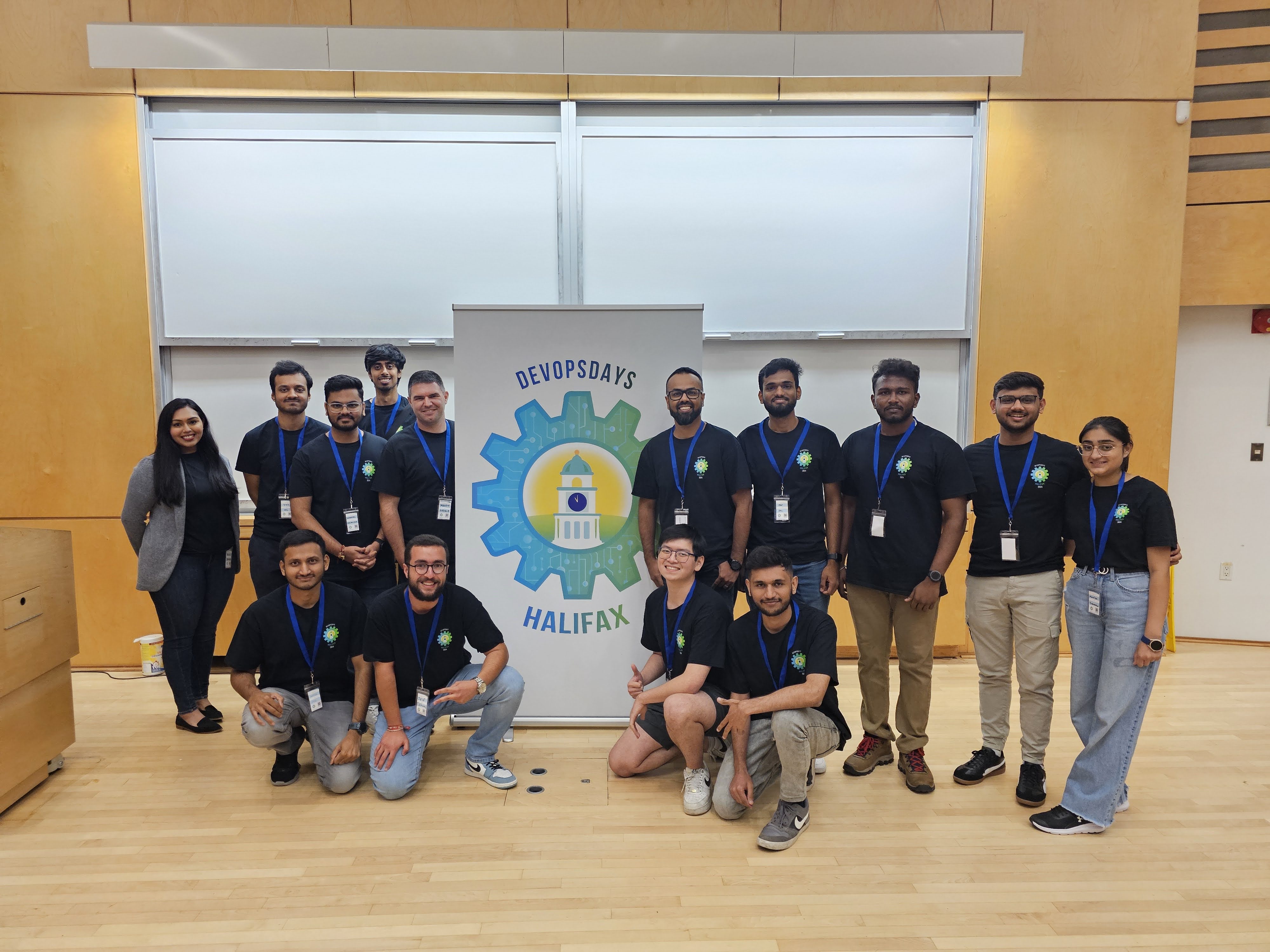
Our volunteers were nothing short of amazing. Their energy, commitment, and attention to detail made the event possible. Whether it was greeting attendees, capturing memorable moments, or helping with technical setups, they stepped up and delivered. We genuinely cannot thank them enough.
Website, CfP, and Ticket Sales
One of the significant advantages of organizing a DevOpsDays event instead of a generic tech conference is the extensive support provided by the DevOpsDays community. They offer a framework and hosting for your event website, which we built using a Hugo template. While we had to submit pull requests to customize and launch our site, the support made it much easier to establish our online presence. You can check out our site here: DevOpsDays Halifax.
For the Call for Proposals (CfP), DevOpsDays provided us with a hosted instance of Pretalx, which streamlined the process and saved us from paying for a service like Sessionize or similar platforms. Setting it up was straightforward, allowing us to focus on curating quality content for our attendees.
When it came to ticket sales, we benefited once again from the DevOpsDays resources. They offered a hosted instance of Pretix, enabling us to manage ticket sales without the fees associated with platforms like Eventbrite. This was especially important for us, as we aimed to keep costs low while providing access to a diverse audience.
Additionally, we had access to Hosted Sendy for email marketing and Hosted Vault for secure password management, which are valuable tools for event organizers. While we didn’t utilize these services this year, we look forward to incorporating them into our planning for next year’s event.
To support inclusivity, we offered deep discounts for students and individuals from underrepresented groups in tech. We believe that fostering a diverse community is essential for the growth and sustainability of our tech ecosystem.
CfP Review
To ensure we had a diverse and well-rounded review process, we invited a professor from Dalhousie University to join our CfP (Call for Papers) review committee. This addition helped us reach quorum and brought in valuable external insights.
Using Pretalx made the entire process of scoring and reviewing talks much more manageable. The platform allowed us to conduct the initial review asynchronously, but we also blocked off a few two-hour calls to finalize the selections. The built-in email templates for various stages—such as talk acceptance, confirmation, and rejection—were particularly helpful in streamlining communication.
We followed a phased approach to sending out acceptance emails:
- Keynote speakers were booked three months or earlier before the event.
- First-round accepted speakers were notified two months before the conference.
- For those who didn’t confirm their participation in the first round, we reached out to a waiting list of speakers six weeks before the event in a second phase.
Finally… Sponsors 😅
Securing sponsors was one of the most nerve-wracking parts of organizing DevOpsDays Halifax. We knew that sponsorships were essential to cover event costs and make the conference a reality, but the process took time and a lot of hustle.
Our first major breakthrough came when we started a conversation with Digital Nova Scotia, the industry association for Nova Scotia’s $3.6 billion ICT and digital technologies sector. They quickly saw the value in supporting the event and came on board as a gold sponsor. Welcoming Digital Nova Scotia was a huge milestone for us, as it meant we had the backing of one of the most influential tech organizations in the province.
Just a few weeks before the conference, SUSE, a multinational company known for its enterprise-grade Open Source products based on Linux technologies, joined as another gold sponsor. Their support not only bolstered our budget but also brought a level of prestige to the event, showcasing the international interest in our local DevOps community.
We were also thrilled to have MOBIA, a local tech company that helps businesses achieve their potential through digital transformation and thought leadership, join as a silver sponsor. Their commitment to the Halifax tech scene and their support of community-driven initiatives like ours made them a perfect fit for the event.
With these sponsors on board, the dream of DevOpsDays Halifax was finally becoming a reality. Their support provided the financial backbone we needed to pull off the conference, and we couldn’t be more grateful for their belief in our vision.
Event Logistics
Organizing a successful conference requires careful attention to logistics, especially on the day(s) of the event. Here are some key things to watch out for, drawn from our own experiences and those of others in the DevOpsDays community:
-
Sound and Video Checks: Run a sound and video check as early as feasible, and do another one as late as possible. Your AV situation can change as things are set up, so it’s vital to ensure everything is functioning smoothly.
-
Wi-Fi Troubleshooting: If you encounter Wi-Fi problems, don’t hesitate to ask your local admin or network operations center (NOC) to reset the access point closest to the registration desk. This AP handles most connections, and resetting it can help distribute the load more evenly.
-
Stay Hydrated: You won’t drink enough water, so keep reminding yourself to stay hydrated throughout the day. Stock up on water and encourage your team to do the same.
-
Emergency Supplies: Be prepared for the unexpected. If you find yourself missing an item, sending someone to a nearby convenience store can save the day. One organizer shared an experience where they managed to bring in about 100 bottles of water on just 30 minutes’ notice—so don’t underestimate the power of quick solutions!
-
Communication: Have a plan for how you’ll communicate with other organizers, and test it in advance. Slack has not worked well for us in the past, as messages can easily be overlooked. One organizer recounted a year when they used two-way radios, only to discover that two nearby construction crews were using the same frequency. Check with your venue for their frequencies if you choose this option.
-
Volunteer Coordination: Create a schedule outlining who is doing what to ensure a fair distribution of tasks. This helps avoid situations where more introverted volunteers are left to manage the registration desk all day.
-
Be Realistic: Don’t try to be everywhere at once—remember, it’s a marathon, not a sprint. Things will go wrong, and it’s important to give yourselves grace. No one knows how the event was supposed to look in your mind; they only see what’s happening in front of them.
-
Badge Management: Have blank badges and permanent markers on hand for attendees who lose theirs. If you’re using cardboard badges, ensure you have a way to repair them at the registration desk.
-
Run of Show: A detailed run of show should cover everything from when food is set out to who is responsible for turning off the last projector. For DevOpsDays Halifax, I initially set out to create a detailed Run of Show, drawing inspiration from the one used at DevOpsDays Austin (courtesy of Laura from DevOpsDays Austin). I spent a few late nights trying to make it as comprehensive as possible. However, as the event unfolded, it became clear we didn’t need that level of detail. Our event wasn’t as large, and we didn’t have multiple rooms or complex logistics like Austin. In the end, a simple schedule with a few personal notes for the Emcees was more than enough.
This experience taught me an important lesson: while it’s great to take inspiration from other events, no two are the same. Just because something works for one city or conference doesn’t mean it will suit yours. It’s essential to adapt your planning and logistics to fit the unique scale and needs of your event.
-
Speaker Management: Designate a speaker wrangler who knows all the speakers and can track down anyone who might be missing just before their talk. This role is crucial for keeping the schedule on track.
-
Visibility for Organizers and Volunteers: Make sure organizers and volunteers are easily identifiable, whether through brightly colored t-shirts or unique hats. This way, attendees can find help when they need it. At DevOpsDays Halifax 2024, we used different colored lanyards for the hosts and volunteers.
-
Code of Conduct (CoC): While we hope you never have to address a code of conduct issue, it’s wise to have an action plan in place. Always send two organizers to discuss any inappropriate behavior to ensure there’s a witness to the conversation, preferably with a mix of genders. For reference, here’s the CoC for DevOpsDays Halifax.
-
Build Relationships with Venue Staff: Being friendly and polite to venue staff can pay off when you have last-minute requests or realize something has been overlooked.
-
MC Preparedness: Ensure the MC knows how to fill time if needed. Having a few groan-worthy dad jokes on hand can lighten the mood, especially during technical difficulties or when a speaker finishes early. A skilled MC can smooth over any rough edges and keep the event flowing. At DevOpsDays Halifax 2024, we were super lucky to have two of our awesome speakers also wear the hats as Emcees.
Open Spaces at DevOpsDays Halifax
At DevOpsDays Halifax, the Open Spaces became a powerful hub for connection and conversation. For those unfamiliar, Open Spaces are self-organized discussions where attendees suggest topics they’re passionate about or want to learn more about. It’s a flexible and dynamic format, encouraging participants to join or leave conversations as they see fit, guided by the “Law of Mobility” — if you’re not getting value or contributing, you’re free to move to another session.
While many at our event were new to the concept, they quickly embraced it. This year, the focus of most discussions was around finding jobs in tech, a reflection of the current market conditions. We had a great mix of hiring managers, seasoned professionals, and student developers sharing advice, strategies, and opportunities for breaking into or advancing in the tech field.
The open, self-organized nature of these sessions allowed everyone to participate, whether seeking guidance or offering it. It truly showcased the collaborative spirit of DevOps, where every voice mattered, and everyone left with something valuable.
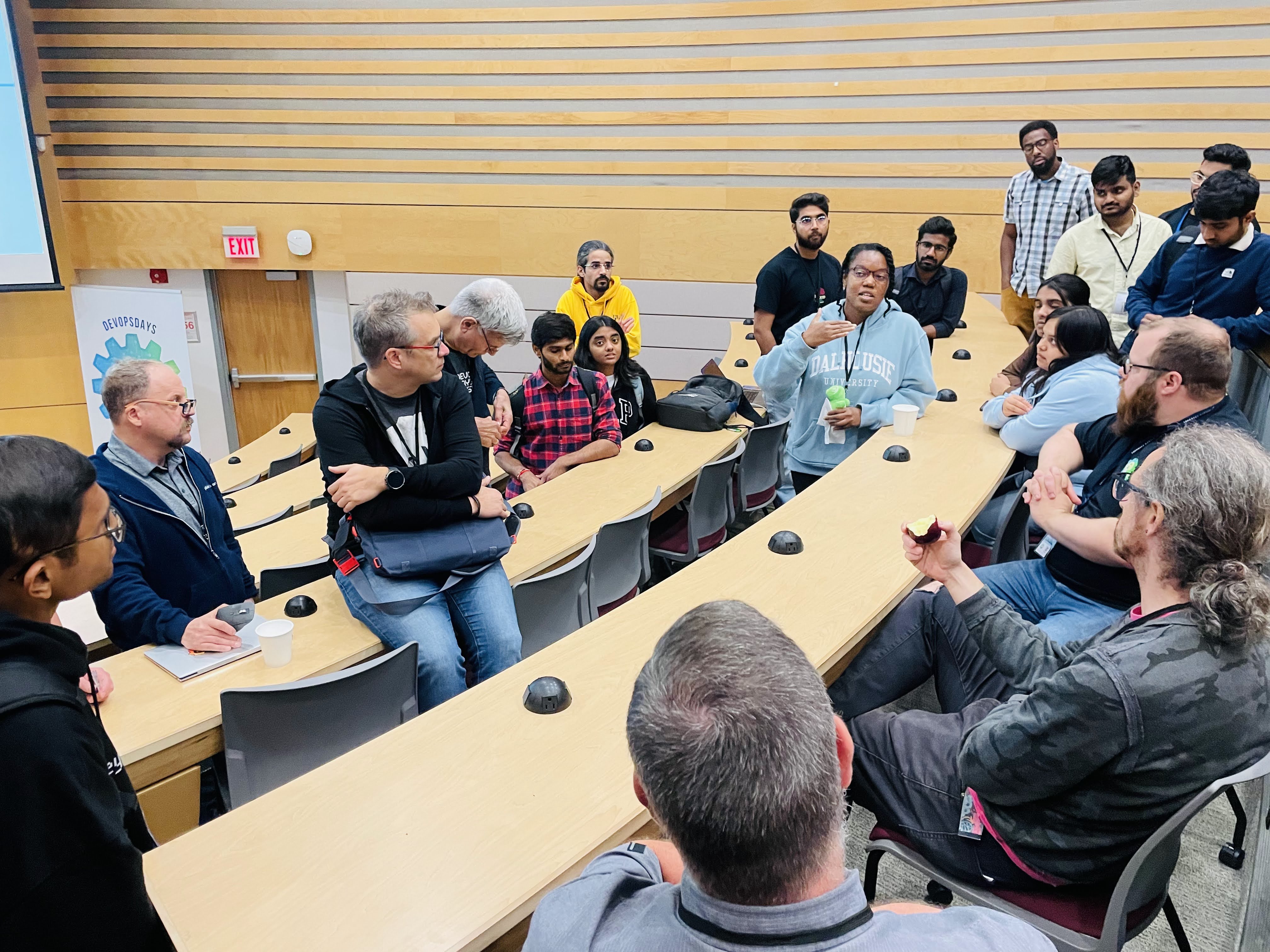
Post-Conference TODOs
Assigning someone to lead post-conference tasks is essential. For DevOpsDays Halifax, our team worked relentlessly leading up to and during the event, but once it was over, we were quickly consumed by our regular jobs. Meanwhile, we still had to publish the slides, sort through 12,000 photos to highlight the best moments, and edit 20 hours of video content. Our student volunteers were back at school, and we were all swamped with other responsibilities. This experience taught me the importance of planning for post-conference tasks well in advance. Including post-event activities in your overall planning ensures nothing falls through the cracks when the event is over.
A Celebration of Community and Collaboration
Organizing DevOpsDays Halifax was both a challenge and a triumph. From the early stages of planning to the final moments of the event, every step was a learning experience. We relied on an amazing team of volunteers, navigated the complexities of sponsorships, and pulled off event logistics that could have easily overwhelmed us. Along the way, we discovered that while inspiration from other events is valuable, each conference has its own unique rhythm and requirements—what works for one may not work for another, and that’s okay.
More importantly, we saw firsthand the power of community. Whether it was the support from local sponsors, the dedication of our volunteers, or the insightful contributions from our speakers, DevOpsDays Halifax became a reality because people came together with passion, energy, and a shared vision. The event wasn’t just about talks or workshops—it was about building connections, sharing knowledge, and fostering a stronger tech community in Atlantic Canada.
Looking back, there were challenges we didn’t anticipate, but we adapted, learned, and grew as organizers and as a team. As we move forward, the lessons we’ve learned will only help us improve and create even better experiences in the future. To anyone thinking about organizing a tech event, my advice is simple: embrace the journey, accept that things won’t always go as planned, and lean on your community—because that’s where the real magic happens.
DevOpsDays Halifax transcended the boundaries of a typical conference; it became a true celebration of collaboration, innovation, and resilience. As we sailed through memorable moments together, we strengthened our bonds and ignited new ideas that will fuel our journey forward. While this year’s event has drawn to a close, we’re already looking ahead to the next chapter—see you at DevOpsDays Halifax 2025!
